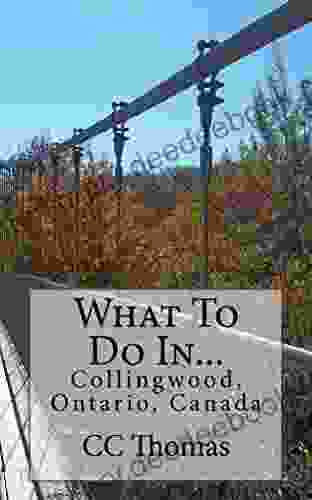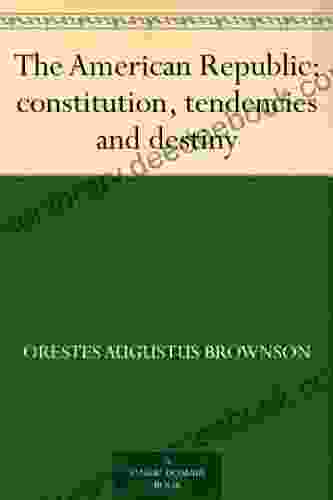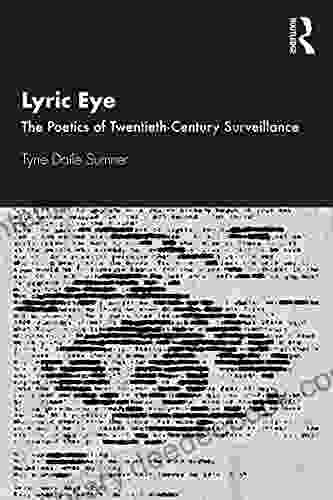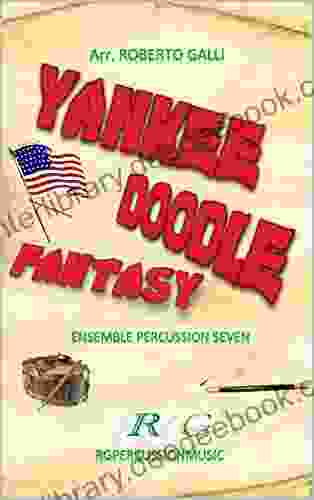Lyric Eye: The Poetics of Twentieth Century Surveillance

Surveillance has been a defining feature of the twentieth century. From the rise of the modern surveillance state to the development of new technologies of surveillance, the increasing scrutiny of our lives has had a profound impact on the way we live and think about ourselves.
Poets have been particularly敏感to the rise of surveillance. As observers and chroniclers of their time, poets have been quick to recognize the ways in which surveillance has shaped the human experience.
4.9 out of 5
| Language | : | English |
| File size | : | 1928 KB |
| Text-to-Speech | : | Enabled |
| Screen Reader | : | Supported |
| Enhanced typesetting | : | Enabled |
| Word Wise | : | Enabled |
| Print length | : | 204 pages |
| X-Ray for textbooks | : | Enabled |
This essay will explore the ways in which surveillance has shaped the literature of the 20th century. We will begin by examining the rise of the modern surveillance state and its impact on poets such as T.S. Eliot and Ezra Pound.
We will then turn our attention to the development of new technologies of surveillance, such as the telephone, the camera, and the computer. We will see how these technologies have been used to surveil poets and how poets have responded to this surveillance in their work.
Finally, we will consider the future of surveillance and its implications for poets. As surveillance becomes increasingly pervasive and intrusive, what will it mean to be a poet in the 21st century?
The Rise of the Modern Surveillance State
The modern surveillance state emerged in the late 19th century with the rise of industrial capitalism. As cities grew and populations became more mobile, governments sought new ways to control their citizens.
One of the most effective ways to control a population is to surveil it. By monitoring people's movements, communications, and activities, governments can identify potential threats and take steps to prevent them.
The rise of the modern surveillance state was a major turning point in history. For the first time, governments had the ability to surveil their citizens on a mass scale.
This new era of surveillance had a profound impact on poets. Poets such as T.S. Eliot and Ezra Pound were among the first to recognize the threat that surveillance posed to individual liberty.
In his poem "The Waste Land," Eliot writes about the "unreal city" where people are "under observation." He describes a world in which people are constantly being watched and judged, and where there is no escape from the prying eyes of the state.
Pound, in his poem "Canto XIII," writes about the "secret agents" who are "watching us." He warns that these agents are "everywhere" and that they are "watching everything we do."
Eliot and Pound were not the only poets to be concerned about the rise of the modern surveillance state. Other poets, such as W.H. Auden, Bertolt Brecht, and Anna Akhmatova, also wrote about the dangers of surveillance.
These poets recognized that surveillance was a threat to individual liberty and that it could be used to suppress dissent and silence criticism.
The Development of New Technologies of Surveillance
The development of new technologies of surveillance in the 20th century further increased the ability of governments to surveil their citizens.
The telephone, the camera, and the computer were all developed in the 20th century, and each of these technologies was quickly adopted by governments for surveillance purposes.
The telephone allowed governments to monitor people's conversations. The camera allowed governments to document people's movements and activities. And the computer allowed governments to store and analyze vast amounts of data about people.
These new technologies of surveillance gave governments unprecedented power to surveil their citizens. And as governments became more sophisticated in their use of surveillance, poets became more outspoken in their criticism of it.
In her poem "Surveillance," Auden writes about the "watchers" who are "always there" and who "know everything about us." He describes a world in which people are constantly being monitored and judged, and where there is no escape from the prying eyes of the state.
Brecht, in his play "The Life of Galileo," writes about the dangers of surveillance when it is used to suppress dissent. He tells the story of Galileo, a scientist who is forced to recant his heliocentric theory because it contradicts the teachings of the church.
Akhmatova, in her poem "Requiem," writes about the suffering of the victims of Stalin's terror. She describes the long lines of people waiting to be arrested and the fear that gripped the entire nation.
These poets recognized that surveillance was a threat to individual liberty and that it could be used to suppress dissent and silence criticism.
The Future of Surveillance
As we enter the 21st century, surveillance is becoming increasingly pervasive and intrusive. New technologies, such as facial recognition and predictive policing, are giving governments the ability to surveil their citizens in ways that were once unimaginable.
This new era of surveillance has serious implications for poets. As surveillance becomes more pervasive, it will be increasingly difficult for poets to write freely and openly about the world around them.
Poets have always played an important role in society by speaking truth to power. They have exposed injustice, challenged authority, and given voice to the voiceless.
In the 21st century, poets will need to continue to play this role. They will need to be vigilant in their criticism of surveillance and they will need to find new ways to write about the world around them without fear of reprisal.
The future of surveillance is uncertain. But one thing is for sure: poets will continue to play an important role in shaping the debate about surveillance and its implications for individual liberty.
Surveillance has been a defining feature of the 20th century. From the rise of the modern surveillance state to the development of new technologies of surveillance, the increasing scrutiny of our lives has had a profound impact on the way we live and think about ourselves.
Poets have been particularlysensitiveto the rise of surveillance. As observers and chroniclers of their time, poets have been quick to recognize the ways in which surveillance has shaped the human experience.
This essay has explored the ways in which surveillance has shaped the literature of the 20th century. We have seen how poets have responded to the rise of the modern surveillance state, the development of new technologies of surveillance, and the future of surveillance.
As we enter the 21st century, surveillance is becoming increasingly pervasive and intrusive. This new era of surveillance has serious implications for poets. But one thing is for sure: poets will continue to play an important role in shaping the debate about surveillance and its implications for individual liberty.
4.9 out of 5
| Language | : | English |
| File size | : | 1928 KB |
| Text-to-Speech | : | Enabled |
| Screen Reader | : | Supported |
| Enhanced typesetting | : | Enabled |
| Word Wise | : | Enabled |
| Print length | : | 204 pages |
| X-Ray for textbooks | : | Enabled |
Do you want to contribute by writing guest posts on this blog?
Please contact us and send us a resume of previous articles that you have written.
 Book
Book Novel
Novel Page
Page Chapter
Chapter Text
Text Story
Story Reader
Reader Library
Library Paperback
Paperback Magazine
Magazine Newspaper
Newspaper Bookmark
Bookmark Synopsis
Synopsis Manuscript
Manuscript Codex
Codex Tome
Tome Bestseller
Bestseller Narrative
Narrative Biography
Biography Autobiography
Autobiography Reference
Reference Encyclopedia
Encyclopedia Dictionary
Dictionary Resolution
Resolution Catalog
Catalog Borrowing
Borrowing Research
Research Scholarly
Scholarly Lending
Lending Reserve
Reserve Reading Room
Reading Room Rare Books
Rare Books Special Collections
Special Collections Interlibrary
Interlibrary Study Group
Study Group Storytelling
Storytelling Awards
Awards Reading List
Reading List Book Club
Book Club Theory
Theory Conrad Bauer
Conrad Bauer Lynn K Hall
Lynn K Hall Tyne Daile Sumner
Tyne Daile Sumner Barakat Akinsiku
Barakat Akinsiku Juanita Bynum
Juanita Bynum Gregory Feifer
Gregory Feifer Margot Theis Raven
Margot Theis Raven Morgan Deane
Morgan Deane Anne Clermont
Anne Clermont Dave Courvoisier
Dave Courvoisier Emma Belmont
Emma Belmont Dan Joseph
Dan Joseph Christopher Farnsworth
Christopher Farnsworth Jamie Brown Hantman
Jamie Brown Hantman Stephen Cornish
Stephen Cornish Mischa Titiev
Mischa Titiev Dan Wallace
Dan Wallace Bond Stanley Ebigbo
Bond Stanley Ebigbo Deborah Lau
Deborah Lau Sharlene Leong
Sharlene Leong
Light bulbAdvertise smarter! Our strategic ad space ensures maximum exposure. Reserve your spot today!

 William ShakespearePeripatoi 12 Athenian Walks: A Comprehensive Guide to Exploring Athens on...
William ShakespearePeripatoi 12 Athenian Walks: A Comprehensive Guide to Exploring Athens on...
 Thomas HardyThe America Play and Other Works: A Theatrical Tapestry Woven by Suzan-Lori...
Thomas HardyThe America Play and Other Works: A Theatrical Tapestry Woven by Suzan-Lori... Heath PowellFollow ·5.2k
Heath PowellFollow ·5.2k Brennan BlairFollow ·18.2k
Brennan BlairFollow ·18.2k Tom HayesFollow ·16.3k
Tom HayesFollow ·16.3k Timothy WardFollow ·5.1k
Timothy WardFollow ·5.1k Mario SimmonsFollow ·15.1k
Mario SimmonsFollow ·15.1k Dawson ReedFollow ·16.1k
Dawson ReedFollow ·16.1k E.E. CummingsFollow ·8.8k
E.E. CummingsFollow ·8.8k John Dos PassosFollow ·17.1k
John Dos PassosFollow ·17.1k

 Bo Cox
Bo CoxDiscover the Enchanting Allure of Collingwood, Ontario,...
Nestled amidst the breathtaking landscape of...

 Ralph Ellison
Ralph EllisonThe Street of Clocks Poems: A Poetic Journey Through Time
Welcome to The Street...

 Dwight Blair
Dwight BlairCritical Political Economy of the Middle East and North...
The Middle East and...

 Deion Simmons
Deion SimmonsPerfect Strategies For Painting Amazing Marine Creatures...
Gouache is a...

 Hugh Bell
Hugh BellThe American Republic: Constitution, Tendencies, and...
The American Republic,...
4.9 out of 5
| Language | : | English |
| File size | : | 1928 KB |
| Text-to-Speech | : | Enabled |
| Screen Reader | : | Supported |
| Enhanced typesetting | : | Enabled |
| Word Wise | : | Enabled |
| Print length | : | 204 pages |
| X-Ray for textbooks | : | Enabled |










